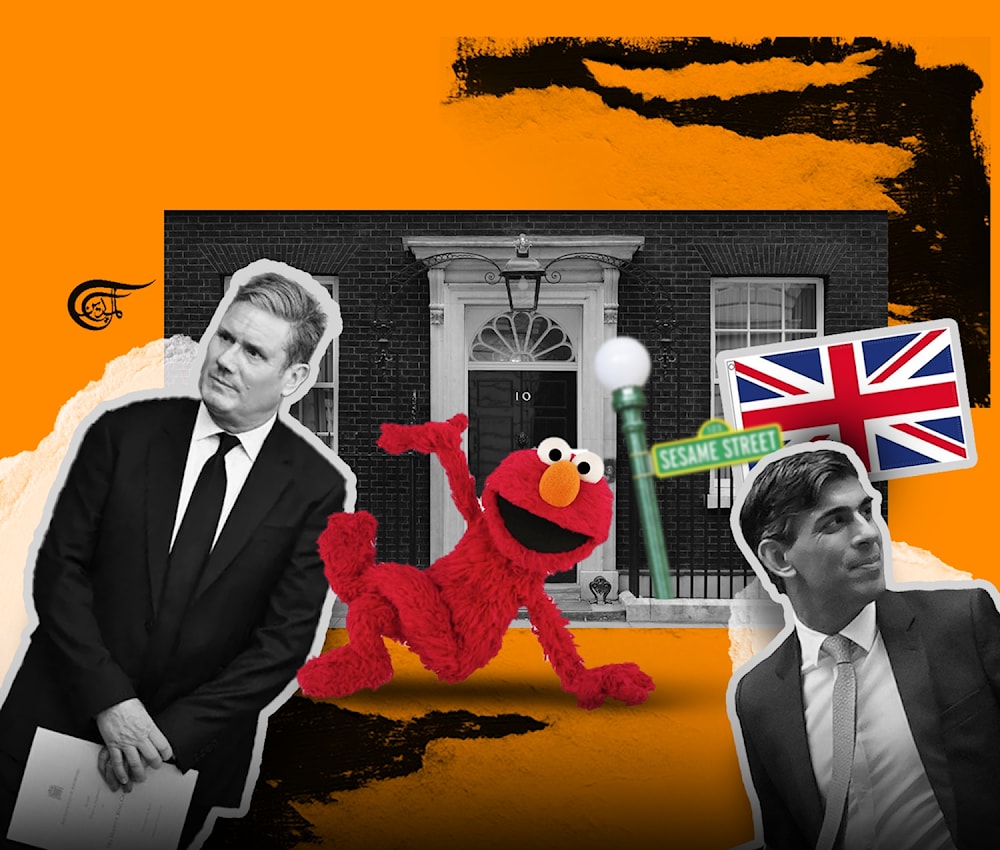The 'stressed' of the West
Last week, a puppet called Elmo – from the popular American children’s TV series Sesame Street – took to social media to ask an apparently innocent question of his followers: “How is everybody doing?”
-

So, thank you, Elmo, for asking, but, no, things probably aren’t so great as we may have once believed they were (Al Mayadeen English; Illustrated by Hadi Dbouk)
The news last week that, after apparently interminable months of deadlock, an agreement had been reached to restore the power-sharing administration in Northern Ireland served in part to remind us how crazily dysfunctional public life in the rest of the United Kingdom has in recent times become.
So, what in the name of insanity is going on in British politics?
In Wales, the Labour first minister has announced he’s stepping down, after his decision to introduce 20 miles-per-hour speed limits on roads in built-up areas saw him plummet in the polls.
In Scotland, the reputation of the Scottish Nationalist government is in tatters following the departure of its long-standing leader, a cascade of financial scandals and news of a semi-official policy to delete potentially embarrassing WhatsApp messages sent during the peak of the Covid-19 crisis.
And, as for England, our dear England… oh dear, England.
Having succeeded in stopping the trains – with many months of rail strikes and the cancellation of the second half of the country’s biggest infrastructure project in decades – Rishi Sunak has set his devious little mind on ‘stopping the boats’ – in other words, preventing the arrival of desperate asylum-seekers who make the dangerous journey from France across the English Channel and whose tragic plight has chilled the hearts of so many of the Conservative Party’s more callous backbenchers in the shadowy recesses of the House of Commons.
In order to do so, he plans to send a small proportion of this tiny proportion of the UK’s migrant population to the central African nation of Rwanda. However, because this scheme has turned out to be rather far from legal, he’s been trying to pass legislation to overturn the judgment of the nation’s Supreme Court and to allow his government to contravene international law.
More moderate members of his party have objected to the worrying precedents this sets, while those on its lunatic fringes have protested that it doesn’t go far enough. They’ve made it painfully clear that if they had their way the country would leave the European Convention on Human Rights and, if it were at all workable, would be towed by the remnants of the Royal Navy at least a thousand miles into the middle of the Atlantic to get as far away as possible from the brie-eating, schnitzel-guzzling folk who inhabit mainland Europe, with all their irritatingly progressive pretensions on the subject of inalienable human rights.
Meanwhile, Mr. Sunak appears now to be one of only two people in Britain who believe the Tories have the slightest chance of winning the next general election, due sometime later this year. Even the diehard right-wing press, and even many of his own MPs, are muttering about the prospect of a Labour landslide.
The only other person in the country who isn’t talking about the near certainty of Keir Starmer becoming the next Prime Minister is Keir Starmer himself. He probably can’t believe his luck. He certainly doesn’t want to jinx it.
And, while Downing Street’s current incumbent has presented himself as the continuity candidate, the change candidate and then the continuity candidate again, Sir Keir has gone out of his way to avoid saying anything or committing to anything that might upset his smooth passage into high office.
When we go to the polls at some unspecified time over the next twelve months – and yes, the suspense is driving us all a little strange – we’ll therefore have to choose between a viciously disingenuous incompetence and an anodyne vagueness as to any actual policy commitments – a reticence founded upon a fear that taking a principled stance might cause offence – and might provide ammunition to those in the right-wing media who’ll pull no punches to scupper Mr. Starmer’s plans for the nation – whatever they may eventually turn out to be.
(If you believe the more eccentric members of Sunak’s top team, those plans include giving everyone seven different kinds of recycling bins, introducing a meat tax, and making the use of private motor cars a capital offence.)
But, of course, we in the United Kingdom should feel relieved that at least we’re not in the United States, where voters this year will be faced with a woeful choice between the terminally sad and the catastrophically mad.
Last week, a puppet called Elmo – from the popular American children’s TV series Sesame Street – took to social media to ask an apparently innocent question of his followers: “How is everybody doing?”
The response he received involved a mass outpouring of angst and grief that set the internet alight. People expressed their “existential dread” and their fear that “the world is burning around us” – and even President Joe Biden joined the online discussion, declaring that “we have to be there for each other”.
Despite our political and economic problems – and in particular here in Britain a cost-of-living crisis that just won’t ease up – it's not the end of the world for those of us who enjoy relatively safe and comfortable lives in western Europe or North America. Yet the horrors we see across the world every day add inexorably to the strains that bear with increasing weight upon the stressed of the West, and, sadly, have started to make many of our fellow citizens start to question the fundamental values and benefits of our moderately liberal democracies.
So, thank you, Elmo, for asking, but, no, things probably aren’t so great as we may have once believed they were.

 Alex Roberts
Alex Roberts
 6 Min Read
6 Min Read











